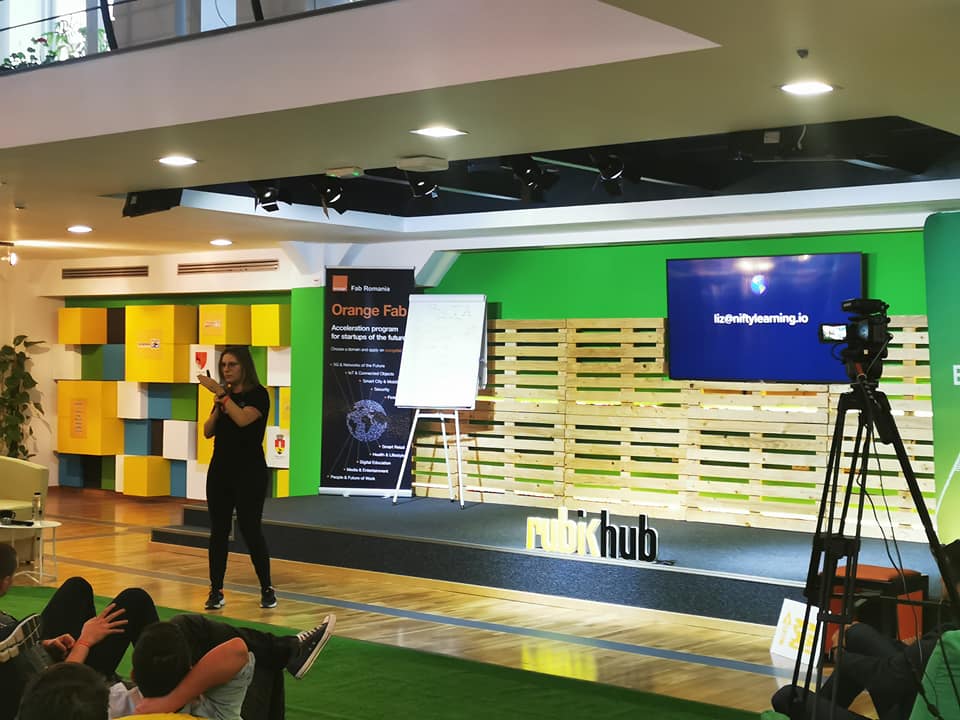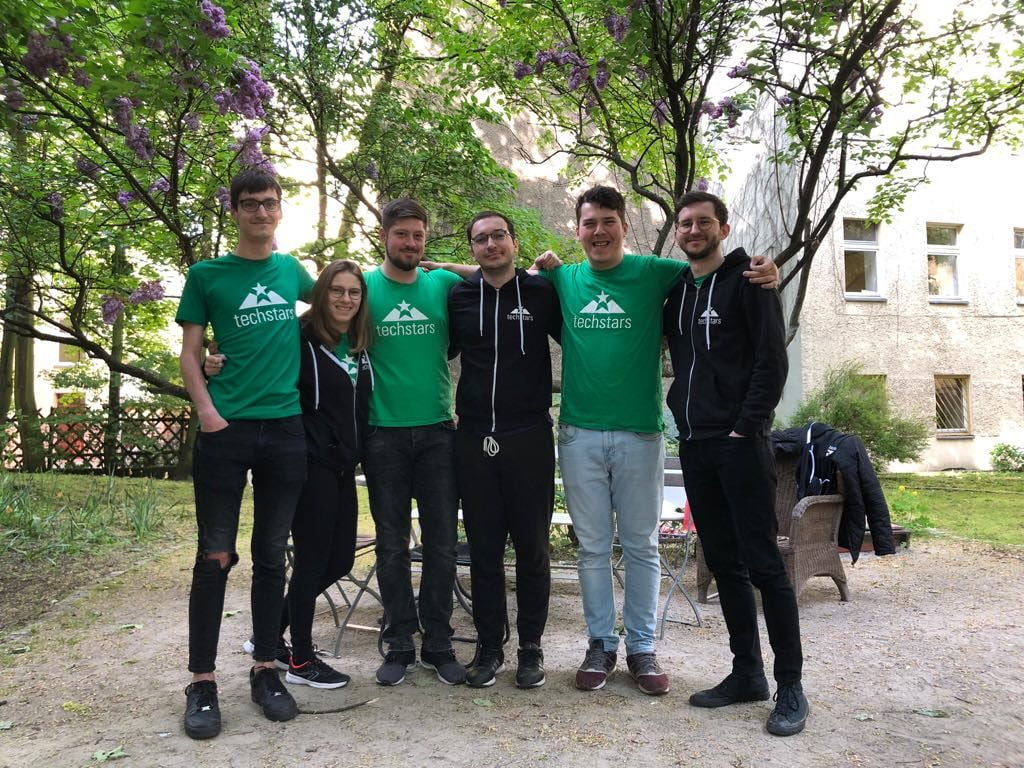
Startup Stories: Liz Ștefan @Nifty Learning
Startup Stories is a series of interviews with great people from the Rubik Hub community! People that have the ability to inspire others, the determination to see the bright side in everything they do and the desire to give back from their experience!
Todays’ episode is about Liz Ștefan, the CEO of Nifty Learning.
Smaranda: Liz, you are the founder and CEO of one of the successful Romanian startups, Nifty Learning!
Please tell us a few things about yourself and about how you found the motivation to choose entrepreneurship as a career opportunity!
Liz: Nifty Learning started out of the need to make training management both more efficient, but also a more fun kind of work. I used to be part of a large company and one of our clients needed to plan over 30.000 training sessions in one year. Most of the work was very repetitive and also very manual, people were working either on actual paper or were stuck in spreadsheets and endless email threads.
It took about a year in that work environment to finally come up with an actual idea for what the solution to this problem could be. At that time I wasn’t very familiar with how powerful web applications could really be and, while I was doing my job, I was also trying to find out more about the possibilities to turn the idea into actual software. I was just starting to learn about RPA, ML and other cool things you can do with software and it caught my eye. On the same day as pitching Nifty at Startup Weekend in Iasi, I also quit my corporate job and made a move to go into IT. I needed to understand how software is built, I also needed a change of pace and professional challenges! So going into IT happened at the perfect moment and in the perfect environment.
When I initially thought about Nifty, I didn’t think it would go so far as to become a full time thing, for a long while I actually considered it just a very successful experiment. We worked on Nifty after hours and on weekends well over a year and a half, in total. But we were very lucky to know TBNR, who knew our story and were willing to make the leap and invest in us.

The spring of 2018 was actually the moment when we started working on Nifty full time, we quit our jobs and became entrepreneurs. I’m not sure it was ever a very specific career choice, at least for myself, but more like all the signs pointed in that direction and we couldn’t help but also take a leap of faith. We’ve now been working on Nifty for well over 3 years and we sometimes ask ourselves if we could ever go back to being an employee. We typically just laugh about it for 20 seconds and then we just get to work again.
I guess it would be kind of hard to go back now, after getting the taste of us being our own bosses, even though it can be very confusing sometimes. But I’m not saying that being an employee or an entrepreneur is either good or bad or that they’re even incompatible. There are plenty of books that talk about the ability to do both, at least for a while, until either one becomes too demanding. What’s important is to find something that people like doing and to focus energy and intent in that direction.
Smaranda: What is Nifty Learning? Could you tell us a bit more about the experience so far?
Liz: Nifty Learning is a software solution that helps companies manage their employee training. The typical Nifty user is an L&D manager and their job is to understand what kind of learning content and strategy should be offered to employees, for them to be efficient and satisfied while doing their jobs. Each company has one or more such L&D managers and larger companies have entire departments, whose only job is to manage training operations. What Nifty does is operational intelligence for L&D teams. It’s a mix between a project management tool, to make it easy for L&D to do their daily jobs, and a learning data analytics engine, to know in real-time how much content employees access, what are the costs of L&D, how efficient this whole process is.
We initially started out as an administrative tool, basically a way for L&D people to automate all the repetitive emails that they were sending every day (booking trainer or room, sending out invitations, reminders, finding last-minute replacements, sending attendance sheets, feedback forms, tracking costs and so on). We had the amazing opportunity to go through Techstars last year, in spring, and while we were there we pivoted towards this larger vision, to gather learning data from as many sources as possible and to map out what kind of learning is efficient for which learner – for example, eLearning solutions like Udemy or Pluralsight, classroom activities, webinars, conferences, other types of learning experiences are all opportunities to gather some data about someone’s learning process and behavior.
After graduating Techstars and coming back home, we started out first collaborations in early autumn and since then we’ve been focused on growing our business even more.
Right now, we’re starting to look outside the country, specifically the UK and the US and we’re part of the SoGal Global Pitching Competition Final. I will be presenting Nifty to an audience of investors, entrepreneurs, mentors on the 29th of February in San Francisco.
Smaranda: Liz, good luck with that, I’m sure you’ll have a great pitch! Meanwhile, please tell me what do you appreciate so far at being a startup founder?
Liz: I used to think that I can’t wait to be my own boss, so I can decide my own work schedule. But this is only scratching the surface of what being an entrepreneur! I’m learning new things every day, about myself and about this kind of work. More than anything, right now, I appreciate the fact that we’re building something that customers find useful. They give us feedback and suggestions and requests for new features almost every day. It’s a sign that we’re on the right track and that we’ve found something of value that we can truly build a global business around. I’m really excited for the next thing that I will love about being an entrepreneur.
Smaranda: How important do you believe belonging to a startup community is and can that help you?
The best experience we’ve had with this so far, as a team, was being part of Techstars. When you arrive, the first thing they tell you is “Welcome to the Techstars family, you’re now part of this for life!”. And their motto is “Give First”, which is very similar to Rubik’s, if I remember right! Being around the same kind of people, with similar values, who work at a very accelerated pace and can troubleshoot together is priceless. We realized how much we missed this exact feeling when we came back home last summer and we found it hard to get the same momentum going. It’s really inspiring to have people to talk to who can understand exactly what you mean and can give you relevant advice. And also celebrating your progress in such an environment is a bit different. Your parents or your friends are outsiders, in a way, they’re very happy for you, truly, but can’t fully empathize. It’s one to tell your mom that you signed your first contract and another to tell a fellow entrepreneur, who’s seen you every day working hard on that agreement and finally making it happen. There’s a strong sense of belonging that makes a real difference in how motivated you can be to keep following your dreams.
Smaranda: You are one of the active members of the Rubik Hub community and we are grateful for that! As a mentor, what kind of advice would you give to those who are about to start or who recently started and have innovative ideas, the needed energy to jump in such an adventurous journey, but maybe also some fear of failing?!
Liz: My advice is very simple: be brave. It’s never too early and no idea is too crazy. And the earlier you are brave about what you want, the earlier you’ll figure out if it’s the right thing for you, your aspirations, your career choice and, ultimately, what makes you tick, what makes you eager to get out of bed in the morning. Not that there won’t be hard days, but the fact that you’re pursuing a dream makes it all good in the end.
